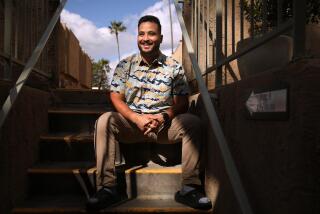Gambling Surge Among Seniors Alarms Experts
- Share via
ATLANTIC CITY, N.J. — The chartered bus from Brooklyn was just one of hundreds that roll into the depots of Atlantic City’s huge casinos each day. The passengers disembarked, some spry and feisty, a few inching down the steps with their canes.
Past the Showboat Casino’s reception desks and uniformed greeters awaited slot machines by the thousands--the playthings of choice for legions of elderly Americans.
Group leader Lola Kendzierski was ready for action. For most of the 2 1/2-hour bus ride, she had been calling out numbers over a microphone as fellow members of her Brooklyn senior center played small-stakes bingo. Toward noon, as the bus came within sight of the high-rise casino hotels, she finally had breakfast.
“I bring two rolls with me, so I can go a whole day in Atlantic City and never eat,” said Kendzierski, 77.
Twenty years ago, Atlantic City and Las Vegas were America’s two gambling meccas, but casinos have now spread throughout the nation. A federal study found that the percentage of 65-and-over Americans who recently gambled jumped from 20% in 1974 to 50% in 1998, a surge unmatched by any age group.
Experts on compulsive gambling are alarmed. They worry that senior gamblers, many of them on fixed incomes, are more vulnerable to financial devastation than younger gamblers, and less willing to seek timely help for addiction.
“A 30-year-old can make it back. If a 75-year-old loses everything, they’re dead in the water,” said Ron Karpin, a specialist in senior gambling with the Council on Compulsive Gambling of New Jersey.
To Kendzierski and her friends, however, monthly outings to the casinos are a much-anticipated break in their routines. “I don’t smoke, I don’t drink,” Kendzierski said. “My worst vice is ice cream.”
Even critics of the gambling industry concede that casinos make seniors feel welcome. Surveys indicate that casino outings are the most popular type of day trip for retired Americans.
“The gaming industry has provided for older adults what we as a society have not done,” said Pat Fowler, executive director of the Florida Council on Compulsive Gambling.
“For most of them, it’s an exciting, safe, user-friendly outing,” she said. “The message is, ‘We value you; come on in. We’ll get the wheelchair, we’ll bring the refreshments to you.’ They can’t find that kind of reception in many areas in our society.”
Kendzierski, negotiating the maze of slot machines and gaming tables at Showboat, marveled that the casino welcomes even gamblers who are blind or mentally disabled. “This is the most democratic place I know,” she said.
Only in the last few years have academics and gambling-addiction experts begun to focus on the phenomenon of senior gambling. Though regional symposiums on the topic are now commonplace, there is a lack of definitive data showing whether the elderly are more or less prone to addiction than younger gamblers.
Regardless of the addiction rate, experts like Karpin and Fowler believe senior gamblers merit special attention because the consequences of compulsive gambling can be so severe.
“I know the pain associated with this disorder in this age group,” Fowler said. “They are thinking, ‘How could this happen to me? I did everything right. I worked, I saved, I took care of my family.’
“The shame associated with what they see as failure of an entire life is so devastating for them,” Fowler said. “No one should have that legacy after a productive, well-spent life, simply because they fall prey to an addiction.”
Kendzierski, who has led many casino trips from the Bay Ridge Center for Older Adults in Brooklyn, said she has noticed little financial distress within her groups.
The trip itself--gambling losses aside--is a low-cost endeavor. The 35 participants on a recent weekday paid $20 for round-trip bus fare, and got $16 apiece in cash from the casino when they arrived for a six-hour stay.
Like many of her friends, Kendzierski came with a predetermined stake. Occasionally she might lose more than intended, she said, but overall she considers gambling a controllable indulgence.
“I get to a certain point, and then I quit and go read in the depot,” she said.
Kendzierski’s husband, who never gambled, died in 1976.
“I still miss him,” she said, explaining that the Atlantic City excursions help ward off loneliness.
Her friend, Pam Olsen, also is a widow in her 70s. Olsen grew up in an orphanage on Long Island and was married for 40 years to a tugboat captain who loved gambling. He died in 1986, and since then she has continued to make regular visits to Atlantic City--perhaps 10 a year.
On the recent outing, Olsen ended up a loser for the day despite winning $60 from a slot machine at one point.
“I’m happy, though” she said before boarding the bus for the trip back home. “Let somebody else win.”
Loneliness, boredom, a craving for excitement--those are factors often cited as fueling the surge in senior gambling.
“Given our medical ability, someone retiring at 55 can easily live another 30, 40 years--literally another lifetime after retirement,” Fowler said. “Some individuals have a difficult time filling the days, and gambling becomes very attractive for them. . . . We must be able to offer an alternative.”
That may not be easy. Casinos--with their bustle, lights, music and all-you-can-eat buffets--have a very different lure from shuffleboard or bridge.
“Today’s 70-year-olds, on average, are smarter, healthier, more affluent than in the past; they don’t want to sit in a senior center until doomsday,” Karpin said. “Casinos can make them feel young again.”
Dennis McNeilly, a psychologist at the University of Nebraska Medical Center in Omaha, has discerned some broad patterns in his studies of senior gamblers.
“This is the generation that grew up in the Depression; they remember the ration books from World War II,” he said. “They’ve been pretty stoic and haven’t taken a lot of risks. They put their family needs before their own. Now they have some disposable income, and more leisure time, they’re looking for something new and exciting and fun.
“Socially, culturally, gambling has really changed,” McNeilly said. “This age group watched it change from a sin or a vice to mainstream entertainment.”
The general manager of the Showboat, Tom O’Donnell, said his casino’s prime marketing targets are 45-55-year-olds, but it cultivates senior citizens diligently. He cited the efforts to accommodate physically impaired gamblers and the “nostalgia-oriented” entertainment. The latest attraction was the Glenn Miller Orchestra, playing hits from the Swing Era of the 1930s and ‘40s.
Showboat’s owner, Harrah’s Entertainment Inc., considers itself an industry leader in promoting “responsible gaming.” It publicizes the toll-free numbers of gambling help lines and has curtailed advertising in media outlets with large audiences of young people.
However, compulsive gambling groups said the industry has done little to address specific problems of elderly gamblers.
“The industry is aware seniors are a big group that loves to play,” said Keith Whyte, executive director of the National Council on Problem Gambling. “But I don’t see any evidence they’re acknowledging that some of these people could really have a problem.
“If they’re going to develop special marketing for these folks, then let’s also design a problem-gambling program targeted especially for them,” Whyte said.
Some state groups are taking such initiatives. Minnesota’s gambling council distributes posters showing an elderly woman at a slot machine, with the caption: “Do you really want to spend your golden years hooked up to a machine?”
Fowler said awareness programs for senior gamblers must be tactful.
“They do not want to be told what to do,” she said. “It’s insulting and demeaning to suggest you shouldn’t be doing this because you’re too old.”
Kendzierski, shepherding her group back to Brooklyn, said she occasionally has tried to dissuade acquaintances from joining the casino trips because of worries they might lose too much. In general, though, she respects each group member’s judgment.
“We’re adults,” she said. “If you can’t afford it, you shouldn’t come.”
A few members of the group seemed downbeat as they filed back on the bus at 6 p.m., but Kendzierski had an antidote. There were TV screens on the bus, and she played a video of comedy highlights--Laurel and Hardy, Jackie Gleason, Lucille Ball, among others.
“If you’ve lost, you need the laughter,” she said, gently.
*
National Council on Problem Gambling: www.ncpgambling.org
American Gaming Assn.:
www.americangaming.org
More to Read
Sign up for Essential California
The most important California stories and recommendations in your inbox every morning.
You may occasionally receive promotional content from the Los Angeles Times.













